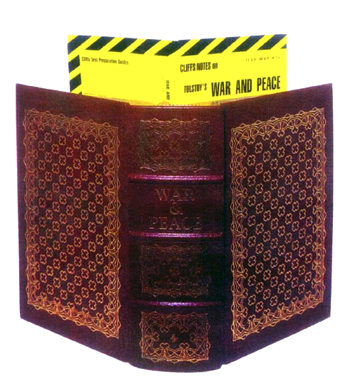Everyone claims to be perusing Proust, but who are they kidding? Confessions of a literary faker.
By Barbara Guggenheim
It’s a recurring nightmare. Dewar’s calls. They’re interviewing me for a whiskey ad and everything’s going well until the final question: “What’s the last book you’ve read?” If I were telling the truth, I’d have to mention Jackie Collins. But I’m ready with a list: Hawking’s A Brief History of Time, Proust’s Remembrance of Things Past and Marshall McLuhan and Quentin Fiore’s The Medium is the Massage.
Have I read any of these? Absolutely not. Faking what you’ve read is a widespread offense, and I’m a serial offender.

Over a Cobb salad at Bameys, I asked my friend Marie, “Reading anything good?” I was leaving the next day for Mexico and desperate for a book I could sink my teeth into. “Schopenhauer,” she said, giving me a superior smile. My response was knee-jerk: “l read him in college.” Marie countered, “In German? It’s soooo much better in the original.” I clenched my teeth and forced a smile.
On my way out of the restaurant, it hit me. There was no way Marie was reading Schopenhauer – not in German, not in English, not even in comic book form. Why would she fake it with me, one of her closest friends? Worse still, why did l fake it back? I hadn’t read Schopenhauer in college – at least not that I could remember.
Do you know anyone who’s read Remembrance of Things Past? Not just Swann’s Way – the whole thing. It’s thousands of pages long and would take two years if you did nothing else. But Proust is everyone’s bellwether. Asking “Have you read Proust?” is a way of taking someone’s intellectual and cultural temperature. Having read part of Swann’s Way, this is one I can answer honestly. “Un peu,’‘ I say.
There are many reasons people lie about their reading habits. If you’re a young guy trying to get a girl, I can understand. When my husband arrived at Harvard Law School, having spent his teenage years as a surfer in L.A. his first date – a Radcliffe girl – said he reminded her of Senlin. He had no idea what she was talking about. The following day he plunged into a volume of 20th-century poetry and was able to begin their next date with, “I’ve just stepped off that ‘swiftly tilting planet,'” quoting from the Conrad Aiken poem she’d alluded to. After that, he was rarely caught without a line of poetry he could sneak into the conversation. I suppose it was foreplay.
Many people fake it because they just don’t have the time ro read. l started down that dangerous road in college. With five courses and an after-school job, Cliffs Notes were the answer to my prayers. Maybe if didn’t get to experience the joy of reveling in fine prose (can you do that at 18 anyway? ), but at least I passed my lit classes. I fantasized about a day when I would have the time to lie around all day reading. The day never came.
I went on to work in the art world, which is rife with unreadable books. Even the glossy magazine Artforum seems deliberately opaque. My husband once took a copy into the bathroom with him, determined to keep it there until he understood every article. Three years later, the magazine is still there.
At a recent interview for an art-consulting assignment, I was asked by the head of a large conglomerate to name the journals I regularly read. What if I hadn’t said Foreign Affairs and the New York Review of Books? What if I’d told the truth – People and In Style? The interview might have taken a turn for the honest: “Do you think Camilla and Charles will ever marry?” Then again, I might not have gotten the job.
Sometimes people fake it because they don’t want to be left out. That’s why I joined a book club. If I read some best-sellers, I reckoned, I’d have more interesting things to say at cocktail parties. Right away I could tell that my friend Susie was faking all the reading. She’d skim a few pages, and the night before the meeting, she’d call around, parching together some plot details and stylistic observations. I told her it would be quicker to read the damn book than to go through all her machinations, but she never bothered – and during the discussions she always managed to make the most insightful observations.
It drove the rest of us crazy.
The more you lie, of course, the greater the risk you’ll get caught. Someday I know I’ll run into the one vicious person in a thousand who’ll spring the fake follow-up question. When he asks me if I liked the scene at the beach restaurant, I’ll say,”Yes, wasn’t it beautifully written?” And he’ll say, “There was no such scene.”
I rushed to Brentano’s after leaving Marie. Maybe it was time I read War And Peace for real – all 1,185 pages. As I walked the aisles, I saw, for the first time since college a rack of Cliffs Notes – all shiny, yellow and black. And there it was: War And Peace, a mere 120 pages. I glanced furtively over my shoulder to make sure no one I knew was looking. Should I or shouldn’t I?
For good measure I also grabbed Anna Karenina.

